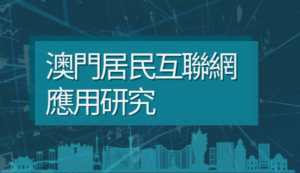
澳門居民網絡素養研究重點了解居民使用互聯網的情況及其網絡素養,包括網絡技能、網絡安全、網絡道德及自我管理四個維度,並綜合計算網絡素養整體得分,旨在了解居民的網絡素養狀況,並通過識別居民在網絡上面臨的風險,為提升他們的網絡安全意識和自我保護能力提供參考。
本會分別於2022年至2024年進行了「澳門未成年人網絡素養」專項研究,研究結果顯示2024年網民的網絡素養整體得分為3.5分(以1-5分計算),與2022年及2023年相同,呈穩定趨勢。
在如今智能互聯網時代,網絡素養及AI素養已成為社會熱議的話題,如何讓未成年人的網絡素養及AI素養跟上人工智能技術發展的步伐,在掌握科技工具的同時健康成長,是社會現時關注的重點。因此,澳門互聯網研究學會於2024年7月至8月期間,透過隨機抽樣電話調查的方式成功訪問了1,000名6-84歲合資格的本澳居民,以了解澳門未成年人的網絡素養及AI素養狀況,調查結果對照官方公佈的人口數據,經過性別及年齡作加權處理。
最新報告下載:
Special Report on the Digital Literacy of Minors in Macao 2024 (Executive Summary)
最新報告摘要
- 6-11歲未成年人的上網率維持在八成以上,12-17歲未成年人已全部上網,休閒娛樂為未成年網民的主要上網目的
- 研究基於過往的調查研究,將網絡素養分為「網絡技能」、「網絡安全」、「網絡道德」及「自我管理」四個維度,並綜合計算網絡素養整體得分。
- 2024年網民的網絡素養整體得分為3.5分(以1-5分計算),與2022年及2023年相同,呈穩定趨勢
- 網齡越大、日均上網時間越長的未成年網民的「網絡技能」得分相對越高,但「自我管理」得分相對越低
- 12至17歲未成年網民的「網絡技能」得分相對最高(4.0分) ,但「自我管理」得分相對最低(3.1分)
- 6-11歲網民主動舉報/投訴不良資訊的意願更高,但相對更容易使用不正確的用語去攻擊別人
- 6-11歲網民的「自我管理」得分呈逐年降低趨勢(2022年:3.7分,2023年:3.4分,2024年:3.3分)
- 未成年網民對「生成式AI」使用率(28%)稍高於成年網民(27%)
- 研究將AI素養分為「基礎知識」、「應用技能」及「風險感知」三個維度,並綜合計算AI素養整體得分,網民的AI素養整體得分為3.3分
- 未成年網民在AI素養各維度的得分均高於成年網民
研究建議
- 社會各界宜幫助未成年人拓展網絡的應用廣度與深度,並強化網絡道德教育,幫助他們文明上網
- 父母及監護人需要以身作則,在孩子面前展示如何合理使用網絡,與孩子共同建立上網規則,增强未成年人的自我管理意識
- 教育系統宜繼續加強對未成年人的網絡及AI素養教育,構建一個AI與HI協同工作的協作教育生態系統
Executive Summary
- The internet adoption rate among minors aged 6-11 remains above 80%, while all minors aged 12-17 are online, primarily for leisure and entertainment purposes
- Based on previous survey research, the report categorizes internet literacy into four dimensions: internet skills, internet safety, internet ethics, and self-management, and calculates an overall score for internet literacy
- The overall score for internet literacy among internet users in 2024 is 3.5 (on a scale of 1 to 5), which is the same as in 2022 and 2023, showing a stable trend
- Minors with longer internet usage periods and daily online time tend to score higher in “internet skills,” but lower in “self-management”
- Among minors aged 12-17, the score for “internet skills” is relatively high (4.0), while the score for “self-management” is relatively low (3.1)
- Minors aged 6-11 show a higher willingness to report/complain about inappropriate information, but they are also more likely to use hostile language to attack others
- The “self-management” score for users aged 6-11 shows a declining trend each year (2022: 3.7, 2023: 3.4, 2024: 3.3)
- The usage rate of “generative AI” among minors is slightly higher (28%) than that of adults (27%)
- The report categorizes AI literacy into three dimensions: foundational knowledge, application skills, and risk.
- The overall score for AI literacy among internet users is 3.3
- Minors score higher than adults in all aspects of AI literacy
Research Recommendations
- Society should help minors expand the breadth and depth of their internet applications and strengthen internet ethics education to assist them in being responsible online
- Parents and guardians need to lead by example, demonstrating reasonable internet use in front of their children, and collaboratively establish internet usage rules to enhance minors’ self-management awareness
- The education sector should continue to strengthen internet and AI literacy education for minors, creating a collaborative educational ecosystem where AI and human intelligence (HI) work together




